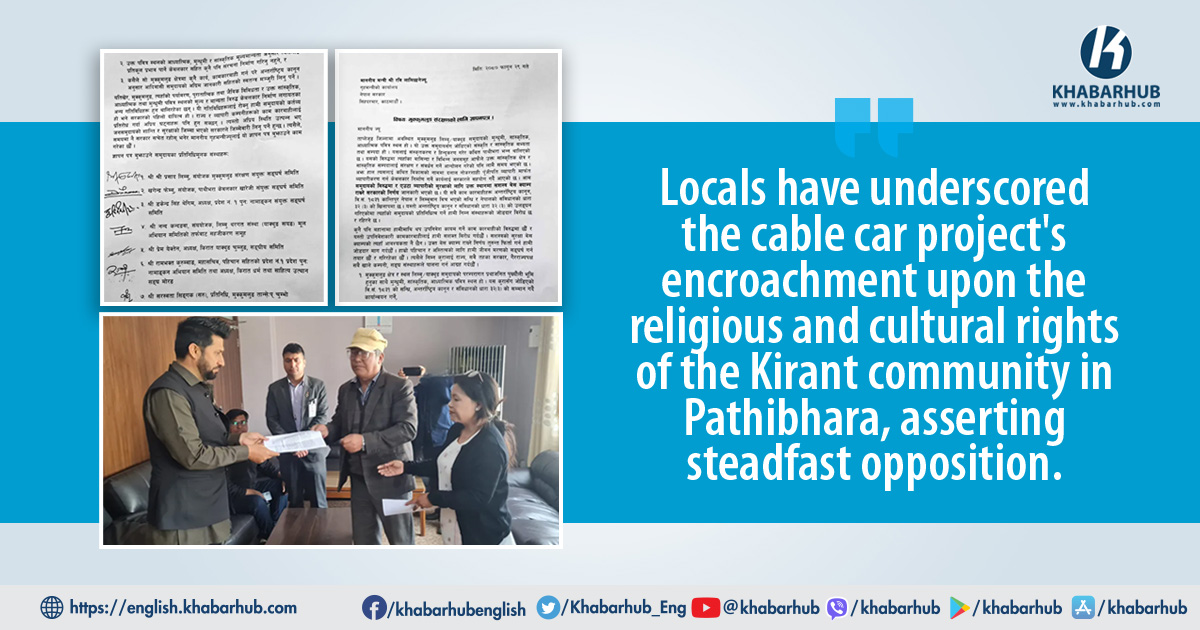KATHMANDU: Businessman Chandra Dhakal’s pursuit of constructing a cable car in Pathibhara in Nepal’s Taplejung district, stands in stark contrast to the wishes of the local community and shows disregard for their religious sentiments.
With the backing of government agencies, Dhakal, also the President of the Federation of Nepal Chamber of Commerce and Industry (FNCCI), has pressed ahead with the project despite opposition from locals and concerns about its impact on the sacred site and surrounding forests.
In defiance of local objections, Dhakal has leveraged his political and administrative influence to commence construction of the cable car on Pathibhara hill, with governmental bodies lending support.
This unilateral action has sparked outrage among residents, prompting the formation of a protest committee led by Khagendra Fembo Limbu, Coordinator of the Kanchenjunga Conservation Management Council.
Numerous stakeholders, including 13 transport-related organizations, have voiced opposition to Dhakal’s venture, citing its potential to disrupt religious practices and cultural heritage.
Warning of potential conflict, the locals cautioned Lamichhane against deploying armed police in support of Dhakal’s interests.
Despite these concerns, Dhakal has pushed forward, seeking police intervention to facilitate the project, although Home Minister Rabi Lamichhane has pledged not to deploy law enforcement for individual endeavors.
Home Minister Lamichhane has reassured the locals that the country’s police system will remain impartial and not favor any businessman or individual.
This statement comes amidst mounting opposition to the proposed cable car project in Pathibhara, Taplejung.
It should be noted that the government’s plan to establish an armed police camp at the foothills of Pathibhara sparked outcry from local residents and identity advocates, who fear it serves the interests of businessman Dhakal.
During a meeting with Deputy Prime Minister Lamichhane at the Ministry of Home Affairs last week, identity supporters voiced their concerns, urging against the construction of the cable car and the establishment of the police camp.
In a controversial move, Dhakal secured approval in 2075 BS to operate the cable car for 40 years, with provisions for biennial renewals, demonstrating a brazen disregard for environmental sustainability.
Warning of potential conflict, the locals cautioned Lamichhane against deploying armed police in support of Dhakal’s interests.
In response, Lamichhane affirmed the commitment of Nepal Police and Armed Police to prioritize the welfare of the common people over any individual’s agenda.
Khagendra Fembu has been a vocal critic of the proposed cable car project from its inception, arguing vehemently against its construction in the revered locale.
He underscored the project’s encroachment upon the religious and cultural rights of the Kirant community, asserting steadfast opposition.
“We have relentlessly opposed the construction of the cable car in Pathibhara. We pursued legal avenues, and when met with resistance, resorted to on-ground obstruction. However, the capitalists seem to have influenced the judiciary and government officials,” he stated.
“Our demand remains simple: Preserve Pathibhara in its natural and religious sanctity. Turning it into a commercial hub akin to Chandragiri is unacceptable to us, as it risks falling under the control of merchants.”
Meanwhile, businessman Dhakal’s failure to engage with the local Thakthung-Limbu community reflects a broader disregard for their input, fueling further resentment.
As tensions escalate, locals are gearing up for a concerted resistance, buoyed by the solidarity of transport businesses and other concerned parties who have jointly condemned the project.
The proposed cable car threatens not only the spiritual significance of Pathibhara, nestled at an altitude of 3,794 meters in Taplejung, but also the livelihoods of those dependent on pilgrimage tourism, they complained.
While visitors frequent the Pathibharadevi Temple year-round, winter sees a surge in tourists drawn by the allure of snow-capped mountains and scenic vistas.
However, amidst this natural splendor lies a contentious issue: the construction of a cable car by the Dhakal group, purportedly in the name of religious reverence but driven primarily by profit motives.
Dhakal’s Pathibhara Darshan Cable Car plans to construct a cable car, a move that necessitates the felling of 10,231 trees across 4.97 hectares of forest land.
Despite the ecological and cultural implications, Dhakal seemed to be undeterred, consolidating control over the project.
Despite the committee’s recommendations to address local community concerns regarding religious, cultural, and environmental impacts, the government pressed forward with Dhakal’s cable car construction plans.
In a controversial move, Dhakal secured approval in 2075 BS to operate the cable car for 40 years, with provisions for biennial renewals, demonstrating a brazen disregard for environmental sustainability.
Moreover, Dhakal and other interest groups are lobbying to amend the Forest Act to facilitate their ventures, exacerbating tensions within the community.
Meanwhile, in an alarming turn of events, the Armed Police Force descended upon Fungling Municipality-11, Kaflepati of Taplejung, ostensibly to establish a camp equipped with basic provisions.
However, locals contend that this move is a blatant misuse of state authority aimed at bolstering the endeavors of Dhakal.
Dhakal’s track record of constructing cable cars and hotels within significant public forests and protected areas, such as Chandragiri, Maulakali, and Butwal, has drawn scrutiny.
His ventures extend to Kaski’s Annapurna Conservation Area and Kailali’s forest area, indicating a pattern of exploiting natural resources for commercial gain.
Upon acquiring shares of Pathibhara Cable Car Darshan Pvt Ltd, Dhakal has seemingly leveraged governmental entities to advance his projects.
Pathibhara Darshan Cable Car Pvt Ltd petitioned the Ministry of Forestry on the Chaitra 27, 2079 BS, requesting a review of decisions concerning tree felling in forested areas during cable car construction.
In response, then-Secretary of the Ministry of Forests and Environment, Rewati Raman Paudel, issued a directive in 2080 BS, tasking the Department of Forestry and Land Conservation with compiling a report and recommendations.
A committee, led by then-Joint Secretary Navraj Pudasaini, was formed, comprising key stakeholders like Koshi State Forest Director Dhananjay Lamichhane, and Ministry Deputy Secretary Babukaji Dallakoti.
Despite the committee’s recommendations to address local community concerns regarding religious, cultural, and environmental impacts, the government pressed forward with Dhakal’s cable car construction plans.









Comment